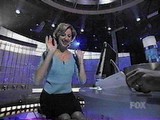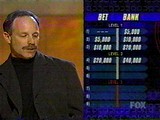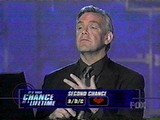


| ||
Front Game Rules | ||

| One player competed alone. At the start of each game, the player was asked the "Credit Card Question," which upon answering correctly paid off the entirety of a player's credit card bill (which was brought along for the show and promptly shredded onstage when won). That prize was safe regardless of the future outcome of the game. | |
| After that question, the player was subjected to up to 9 more questions, divided into three levels of difficulty. The first question of the stack was worth $5000; for each question thereafter, the player could decide how much of their stake they wanted to risk on the question, although they could wager no less than half their score. There were 10 possible categories from which the question could originate; the player got to see the category before making his/her bet. Answering incorrectly ended the game and lost any money wagered, although the player kept the paid credit card debt and any money held back from the bet. | 
| |

| Along the way, the player had the opportunity to use his/her "Second Chance" options. One second chance reduced the question to a multiple-choice question (otherwise it was open-ended), while the other replaced that question with one of his/her favorite category. When the player reached the third level, s/he received a "Last Chance," and could use one of the two options a second time. A player could stop after any correct answer; betting it all on every question and answering each one correctly would win $1,280,000. | |
IYCoaL crowned prime-time's eighth millionaire, when Tim Hsieh went on the show and won $1,040,000. Having both his Favorite Category SC and his Last Chance available, he answered Reuben Kincaid as the manager of TV's Partridge Family to win the million. This shattered my chances at making any kind of significant TV history; not only won't I be the first person to win a million bucks, I won't even be the first Tim to do it! So much for making an impact. :)
You know a show is doing horribly when its performance causes the cancellation of two shows! Admittedly, the betting concept is really the only thing that sets this game apart from WWTBAM, and people are still too enamored with the stripped-down, bare-bones format of WWTBAM than a slightly fancier format. Gordon Elliott is the best part of the show - he strings the players along about as much as Regis should. The color-coding of the levels also adds a nice element to the set as the surroundings get darker and redder the farther the player gets. Still, this show probably came out one year too late. Proof positive that WWTBAM still has the market cornered in prime-time quizzes.